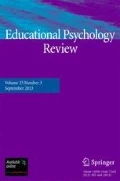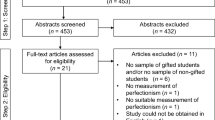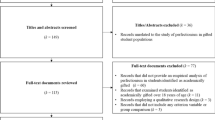Abstract
Over the past two decades, many studies have examined the relationship between perfectionism and academic achievement. However, these studies have yet to be systematically collated and meta-analysed. The purpose of the present study was to do so. A literature search returned 37 studies (N = 8901) and 156 effect sizes. Random-effects meta-analyses indicated that perfectionistic strivings showed a significant small to medium positive relationship with academic achievement (r+ = .24), whereas perfectionistic concerns showed a significant small negative relationship with academic achievement (r+ = − .08). One moderator of these relationships was the instrument that was used to measure perfectionism. This was particularly the case for perfectionistic concerns. The findings suggest that the relationship between perfectionism and academic achievement is complex with perfectionistic strivings potentially aiding and perfectionistic concerns potentially hindering students’ academic achievement.

Similar content being viewed by others
Notes
See Stoeber and Rambow (2007) for details of how this scale was contextualised for use in education.
Analyses were also conducted with mean imputation of the overlap (using the meta-analytic effect size). Effect sizes were not significantly different. Please see the Electronic Supplementary Material for the findings of these analyses.
Age, the measure of academic achievement, and whether achievement was measured objectively or via self-report were also tested as moderating factors, the findings of which were non-significant. These findings can be found in the Electronic Supplementary Material.
Note, however, that this study utilised a cross-lagged panel model, the efficacy of which has been the subject of recent debate (e.g. Hamaker et al. 2015).
References
References marked with an asterisk indicate studies included in the meta-analysis
Adler, A. (1956). The neurotic disposition. In H. L. Ansbacher & R. R. Ansbacher (Eds.), The individual psychology of Alfred Adler (pp. 239–262). New York: Harper.
Bacon, D. R., & Bean, B. (2006). GPA in research studies: an invaluable but neglected opportunity. Journal of Marketing Education, 28(1), 35–42.
*Bieling, P. J., Israeli, A., Smith, J., & Antony, M. M. (2003). Making the grade: the behavioural consequences of perfectionism in the classroom. Personality and Individual Differences, 35, 163–178, 1.
Bieling, P. J., Israeli, A. L., & Antony, M. M. (2004). Is perfectionism good, bad, or both? Examining models of the perfectionism construct. Personality and Individual Differences, 36(6), 1373–1385.
*Blankstein, K. R., & Winkworth, G. R. (2004). Dimensions of perfectionism and levels of attributions for grades: relations with dysphoria and academic performance. Journal of Rational-Emotive & Cognitive-Behavior Therapy, 22, 267–295, 4.
*Bong, M., Hwang, A., Noh, A., & Kim, S. I. (2014). Perfectionism and motivation of adolescents in academic contexts. Journal of Educational Psychology, 106, 711–729, 3.
Borenstein, M., Hedges, L., Higgins, J., & Rothstein, H. (2005). Comprehensive meta-analysis (Version 3.3). Emglewood, NJ: Biostat.
Bosco, F. A., Aguinis, H., Singh, K., Field, J. G., & Pierce, C. A. (2015). Correlational effect size benchmarks. Journal of Applied Psychology, 100(2), 431–449.
*Brown, E. J., Heimberg, R. G., Frost, R. O., Makris, G. S., Juster, H. R., & Leung, A. W. (1999). Relationship of perfectionism to affect, expectations, attributions and performance in the classroom. Journal of Social and Clinical Psychology, 18, 98–120, 1.
*Burnam, A., Komarraju, M., Hamel, R., & Nadler, D. R. (2014). Do adaptive perfectionism and self-determined motivation reduce academic procrastination? Learning and Individual Differences, 36, 165–172.
Burns, D. (1980). The perfectionist’s script for self-defeat. Psychology Today, 14, 34–52.
*Castro, J. R., & Rice, K. G. (2003). Perfectionism and ethnicity: implications for depressive symptoms and self-reported academic achievement. Cultural Diversity and Ethnic Minority Psychology, 9, 64, 1, 78.
Cohen, J. (1992). A power primer. Psychological Bulletin, 112(1), 155–159.
Cohen, J., Cohen, P., West, S. G., & Aiken, L. S. (2003). Applied multiple regression/correlation analysis for the behavioral sciences (3rd ed.). Hillsdale: Erlbaum.
Cox, B. J., Enns, M. W., & Clara, I. P. (2002). The multidimensional structure of perfectionism in clinically distressed and college student samples. Psychological Assessment, 14(3), 365–373.
Cumming, G., & Finch, S. (2005). Inference by eye: confidence intervals and how to read pictures of data. American Psychologist, 60(2), 170–180.
*Damian, L. E., Stoeber, J., Negru, O., & Băban, A. (2014). Perfectionism and achievement goal orientations in adolescent school students. Psychology in the Schools, 51, 960–971, 9.
Damian, L. E., Stoeber, J., Negru-Subtirica, O., & Băban, A. (2017a). Perfectionism and school engagement: a three-wave longitudinal study. Personality and Individual Differences, 105, 179–184.
*Damian, L. E., Stoeber, J., Negru-Subtirica, O., & Băban, A. (2017b). On the development of perfectionism: the longitudinal role of academic achievement and academic efficacy. Journal of Personality, 85, 565–577, 4.
*De Cuyper, K., Pieters, G., Claes, L., Vandromme, H., & Hermans, D. (2013). Indirect measurement of perfectionism: construct and predictive validity. Journal of Social and Clinical Psychology, 32, 844–858, 8.
Dunkley, D. M., Lewkowski, M., Lee, I. A., Preacher, K. J., Zuroff, D. C., Berg, J. L., Foley, J. E., Myhr, G., & Westreich, R. (2017). Daily stress, coping, and negative and positive affect in depression: complex trigger and maintenance patterns. Behavior Therapy, 48(3), 349–365.
Duval, S. J., & Tweedie, R. L. (2000). A nonparametric “trim and fill” method of accounting for publication bias in meta-analysis. Journal of the American Statistical Association, 95, 89–98.
Egger, M., Smith, G. D., Schneider, M., & Minder, C. (1997). Bias in meta-analysis detected by a simple, graphical test. British Medical Journal, 315(7109), 629–634.
*Elion, A. A., Wang, K. T., Slaney, R. B., & French, B. H. (2012). Perfectionism in African American students: relationship to racial identity, GPA, self-esteem, and depression. Cultural Diversity and Ethnic Minority Psychology, 18, 118, 2, 127.
Enns, M. W., & Cox, B. J. (2002). The nature and assessment of perfectionism: a critical analysis. In G. L. Flett & P. L. Hewitt (Eds.), Perfectionism: theory, research, and treatment (pp. 33–62). Washington, DC: American Psychological Association.
*Eum, K., & Rice, K. G. (2011). Test anxiety, perfectionism, goal orientation, and academic performance. Anxiety, Stress, and Coping, 24, 167–178, 2.
Flett, G.L., Hewitt, P.L., Boucher, D., Davidson, L., & Munro, Y. (2001). The child-adolescent perfectionism scale: development, validation, and association with adjustment. Unpublished manuscript.
*Flett, G. L., Blankstein, K. R., & Hewitt, P. L. (2009). Perfectionism, performance, and state positive affect and negative affect after a classroom test. Canadian Journal of School Psychology, 24, 4–18, 1.
*Fong, R. W., & Yuen, M. (2009). Associations among measures of perfectionism, self-concept and academic achievement identified in primary school students in Hong Kong. Gifted and Talented International, 24, 147–154, 1.
Frost, R. O., Marten, P., Lahart, C., & Rosenblate, R. (1990). The dimensions of perfectionism. Cognitive Therapy and Research, 14(5), 449–468.
Frost, R. O., Heimberg, R. G., Holt, C. S., Mattia, J. I., & Neubauer, A. L. (1993). A comparison of two measures of perfectionism. Personality and Individual Differences, 14(1), 119–126.
Gaudreau, P., & Thompson, A. (2010). Testing a 2 × 2 model of dispositional perfectionism. Personality and Individual Differences, 48(5), 532–537.
Gotwals, J. K., Stoeber, J., Dunn, J. G. H., & Stoll, O. (2012). Are perfectionistic strivings in sport adaptive? A systematic review of confirmatory, contradictory, and mixed evidence. Canadian Psychology, 53(4), 263–279.
Groot, W., & Maassen van den Brink, H. (2007). The health effects of education. Economics of Education Review, 26(2), 186–200.
*Grzegorek, J. L., Slaney, R. B., Franze, S., & Rice, K. G. (2004). Self-criticism, dependency, self-esteem, and grade point average satisfaction among clusters of perfectionists and nonperfectionists. Journal of Counseling Psychology, 51, 192, 2, 200.
Hamaker, E. L., Kuiper, R. M., & Grasman, R. P. (2015). A critique of the cross-lagged panel model. Psychological Methods, 20(1), 102–116.
*Harvey, B. C., Moore, A. M., & Koestner, R. (2017). Distinguishing self-oriented perfectionism-striving and self-oriented perfectionism-critical in school-aged children: divergent patterns of perceived parenting, personal affect and school performance. Personality and Individual Differences, 113, 136–141.
Hattie, J. (2008). Visible learning: a synthesis of over 800 meta-analyses relating to achievement. New York, NY: Routledge.
Hewitt, P. L., & Flett, G. L. (1991). Perfectionism in the self and social contexts: conceptualization, assessment, and association with psychopathology. Journal of Personality and Social Psychology, 60(3), 456–470.
Hewitt, P. L., & Flett, G. L. (1993). Dimensions of perfectionism, daily stress, and depression: a test of the specific vulnerability hypothesis. Journal of Abnormal Psychology, 102(1), 58–65.
Higgins, J. P., & Thompson, S. G. (2002). Quantifying heterogeneity in a meta-analysis. Statistics in Medicine, 21(11), 1539–1558.
Hill, A. P., & Curran, T. (2016). Multidimensional perfectionism and burnout: a meta-analysis. Personality and Social Psychology Review, 20(3), 269–288.
Hill, R. W., Huelsman, T. J., Furr, R. M., Kibler, J., Vicente, B. B., & Kennedy, C. (2004). A new measure of perfectionism: the perfectionism inventory. Journal of Personality Assessment, 82(1), 80–91.
Hill, A. P., Hall, H. K., Duda, J. L., & Appleton, P. R. (2011). The cognitive, affective and behavioural responses of self-oriented perfectionists following successive failure on a muscular endurance task. International Journal of Sport and Exercise Psychology, 9(2), 189–207.
Hill, A. P., Mallinson-Howard, S. H., & Jowett, G. E. (2018). Multidimensional perfectionism in sport: a meta-analytical review. Sport Exercise and Performance Psychology, 7(3), 235–270.
Hollender, M. H. (1965). Perfectionism. Comprehensive Psychiatry, 6(2), 94–103.
Jansson-Fröjmark, M., & Linton, S. J. (2007). Is perfectionism related to pre-existing and future insomnia? A prospective study. British Journal of Clinical Psychology, 46(1), 119–124.
*Kawamura, K. Y., Frost, R. O., & Harmatz, M. G. (2002). The relationship of perceived parenting styles to perfectionism. Personality and Individual Differences, 32, 317–327, 2.
*Kljajic, K., Gaudreau, P., & Franche, V. (2017). An investigation of the 2 × 2 model of perfectionism with burnout, engagement, self-regulation, and academic achievement. Learning and Individual Differences, 57, 103–113.
*Leenaars, L., & Lester, D. (2006). Perfectionism, depression, and academic performance. Psychological Reports, 99, 941–942, 7.
Limburg, K., Watson, H. J., Hagger, M. S., & Egan, S. J. (2017). The relationship between perfectionism and psychopathology: a meta-analysis. Journal of Clinical Psychology, 73(10), 1301–1326.
Lipsey, M. W., & Wilson, D. B. (2001). Practical meta-analysis. Thousand Oaks, CA: Sage.
Madigan, D. J., Stoeber, J., Culley, T., Passfield, L., & Hill, A. P. (2018). Perfectionism and training performance: the mediating role of other-approach goals. European Journal of Sport Science, 18(9), 1271–1279.
McAdams, D. P., & Pals, J. L. (2007). The role of theory in personality research. In R. W. Robins, R. C. Fraley, & R. F. Krueger (Eds.), Handbook of research methods in personality psychology (pp. 3–20). New York, NY: Guilford.
Missildine, W. H. (1963). Your inner child of the past. New York: Simon & Schuster.
*Mobley, M., Slaney, R. B., & Rice, K. G. (2005). Cultural validity of the Almost Perfect Scale—revised for African American college students. Journal of Counseling Psychology, 52, 629, 4, 639.
*Nounopoulos, A., Ashby, J. S., & Gilman, R. (2006). Coping resources, perfectionism, and academic performance among adolescents. Psychology in the Schools, 43, 613–622, 5.
O’Connor, M. C., & Paunonen, S. V. (2007). Big Five personality predictors of post-secondary academic performance. Personality and Individual Differences, 43(5), 971–990.
OECD. (2016). Education at a glance 2016: OECD indicators. Paris: OECD Publishing.
Poropat, A. E. (2009). A meta-analysis of the five-factor model of personality and academic performance. Psychological Bulletin, 135(2), 322–338.
*Pulford, B. D., & Sohal, H. (2006). The influence of personality on HE students’ confidence in their academic abilities. Personality and Individual Differences, 41, 1409–1419, 8.
*Rice, K. G., & Ashby, J. S. (2007). An efficient method for classifying perfectionists. Journal of Counseling Psychology, 54, 72, 1, 85.
*Rice, K. G., Lopez, F. G., & Richardson, C. M. (2013a). Perfectionism and performance among STEM students. Journal of Vocational Behavior, 82, 124–134, 2.
*Rice, K. G., Lopez, F. G., Richardson, C. M., & Stinson, J. M. (2013b). Perfectionism moderates stereotype threat effects on STEM majors’ academic performance. Journal of Counseling Psychology, 60, 287, 2, 293.
Richardson, M., Abraham, C., & Bond, R. (2012). Psychological correlates of university students’ academic performance: a systematic review and meta-analysis. Psychological Bulletin, 138(2), 353–387.
Rosenthal, R. (1979). The “file drawer problem” and tolerance for null results. Psychological Bulletin, 86(3), 638–641.
Roth, P. L., & Clarke, R. L. (1998). Meta-analyzing the relation between grades and salary. Journal of Vocational Behavior, 53(3), 386–400.
Rothstein, H. R., Sutton, A. J., & Borenstein, M. (2006). Publication bias in meta-analysis: prevention, assessment and adjustments. New York, NY: Wiley.
Schmidt, F. L., Oh, I. S., & Hayes, T. L. (2009). Fixed- versus random-effects models in meta-analysis: model properties and an empirical comparison of differences in results. British Journal of Mathematical and Statistical Psychology, 62(1), 97–128.
Schneider, M., & Preckel, F. (2017). Variables associated with achievement in higher education: a systematic review of meta-analyses. Psychological Bulletin, 143(6), 565–600.
*Sevlever, M., & Rice, K. G. (2010). Perfectionism, depression, anxiety, and academic performance in premedical students. Canadian Medical Education Journal, 1, 96–104.
*Shaunessy, E., Suldo, S. M., & Friedrich, A. (2011). Mean levels and correlates of perfectionism in international baccalaureate and general education students. High Ability Studies, 22, 61–77, 1.
Sherry, S. B., Hewitt, P. L., Sherry, D. L., Flett, G. L., & Graham, A. R. (2010). Perfectionism dimensions and research productivity in psychology professors: Implications for understanding the (mal) adaptiveness of perfectionism. Canadian Journal of Behavioural Science, 42, 273–283.
*Shim, S. S., Rubenstein, L. D., & Drapeau, C. W. (2016). When perfectionism is coupled with low achievement: the effects on academic engagement and help seeking in middle school. Learning and Individual Differences, 45, 237–244.
Sirois, F. M., Molnar, D. S., & Hirsch, J. K. (2017). A meta-analytic and conceptual update on the associations between procrastination and multidimensional perfectionism. European Journal of Personality, 31(2), 137–159.
Slaney, R. B., & Ashby, J. S. (1996). Perfectionists: Study of a criterion group. Journal of Counseling & Development, 74, 393–398.
*Slaney, R. B., Rice, K. G., Mobley, M., Trippi, J., & Ashby, J. S. (2001). The revised Almost Perfect Scale. Measurement and Evaluation in Counseling and Development, 34, 130–145.
Smith, M. M., Sherry, S. B., Chen, S., Saklofske, D. H., Mushquash, C., Flett, G. L., & Hewitt, P. L. (2018). The perniciousness of perfectionism: a meta-analytic review of the perfectionism-suicide relationship. Journal of Personality, 86(3), 522–542.
Spencer, S. J., Steele, C. M., & Quinn, D. M. (1999). Stereotype threat and women’s math performance. Journal of Experimental Social Psychology, 35(1), 4–28.
Stoeber, J. (2011). The dual nature of perfectionism in sports: relationships with emotion, motivation, and performance. International Review of Sport and Exercise Psychology, 4(2), 128–145.
Stoeber, J. (2012). Perfectionism and performance. In S. M. Murphy (Ed.), The Oxford handbook of sport and performance psychology (pp. 294–306). New York: Oxford University Press.
Stoeber, J. (2018). The psychology of perfectionism. Theory, research, applications. London: Routledge.
*Stoeber, J., & Eismann, U. (2007). Perfectionism in young musicians: relations with motivation, effort, achievement, and distress. Personality and Individual Differences, 43, 2182–2192, 8.
Stoeber, J., & Gaudreau, P. (2017). The advantages of partialling perfectionistic strivings and perfectionistic concerns: critical issues and recommendations. Personality and Individual Differences, 104, 379–386.
Stoeber, J., & Madigan, D. J. (2016). Measuring perfectionism in sport, dance, and exercise: review, critique, recommendations. In A. P. Hill (Ed.), The psychology of perfectionism in sport, dance and exercise (pp. 31–56). London: Routledge.
Stoeber, J., & Otto, K. (2006). Positive conceptions of perfectionism: approaches, evidence, challenges. Personality and Social Psychology Review, 10(4), 295–319.
*Stoeber, J., & Rambow, A. (2007). Perfectionism in adolescent school students: relations with motivation, achievement, and well-being. Personality and Individual Differences, 42, 1379–1389, 7.
Stoeber, J., Otto, K., & Stoll, O. (2006). Multidimensional Inventory of Perfectionism (MIPS): English version. Unpublished manuscript.
*Stoeber, J., Haskew, A. E., & Scott, C. (2015). Perfectionism and exam performance: the mediating effect of task-approach goals. Personality and Individual Differences, 74, 171–176.
Stoeber, J., Damian, L. E., & Madigan, D. J. (2018). Perfectionism: a motivational perspective. In J. Stoeber (Ed.), The psychology of perfectionism: theory, research, and applications. London, UK: Routledge.
*Stornelli, D., Flett, G. L., & Hewitt, P. L. (2009). Perfectionism, achievement, and affect in children: a comparison of students from gifted, arts, and regular programs. Canadian Journal of School Psychology, 24, 267–283, 4.
*Vandiver, B. J., & Worrell, F. C. (2002). The reliability and validity of scores on the Almost Perfect Scale–revised with academically talented middle school students. Journal of Secondary Gifted Education, 13, 108–119, 3.
*Vansteenkiste, M., Smeets, S., Soenens, B., Lens, W., Matos, L., & Deci, E. L. (2010). Autonomous and controlled regulation of performance-approach goals: their relations to perfectionism and educational outcomes. Motivation and Emotion, 34, 333–353, 4.
Vedel, A. (2014). The Big Five and tertiary academic performance: a systematic review and meta-analysis. Personality and Individual Differences, 71, 66–76.
*Verner-Filion, J., & Gaudreau, P. (2010). From perfectionism to academic adjustment: the mediating role of achievement goals. Personality and Individual Differences, 49, 181–186, 3.
*Wang, K. T. (2012). Personal and family perfectionism of Taiwanese college students: relationships with depression, self-esteem, achievement motivation, and academic grades. International Journal of Psychology, 47, 305–314, 4.
*Witcher, L. A., Alexander, E. S., Onwuegbuzie, A. J., Collins, K. M., & Witcher, A. E. (2007). The relationship between psychology students’ levels of perfectionism and achievement in a graduate-level research methodology course. Personality and Individual Differences, 43, 1396–1405, 6.
Author information
Authors and Affiliations
Corresponding author
Additional information
Publisher’s Note
Springer Nature remains neutral with regard to jurisdictional claims in published maps and institutional affiliations.
Electronic Supplementary Material
ESM 1
(DOCX 29 kb)
Rights and permissions
About this article
Cite this article
Madigan, D.J. A Meta-Analysis of Perfectionism and Academic Achievement. Educ Psychol Rev 31, 967–989 (2019). https://doi.org/10.1007/s10648-019-09484-2
Published:
Issue Date:
DOI: https://doi.org/10.1007/s10648-019-09484-2




